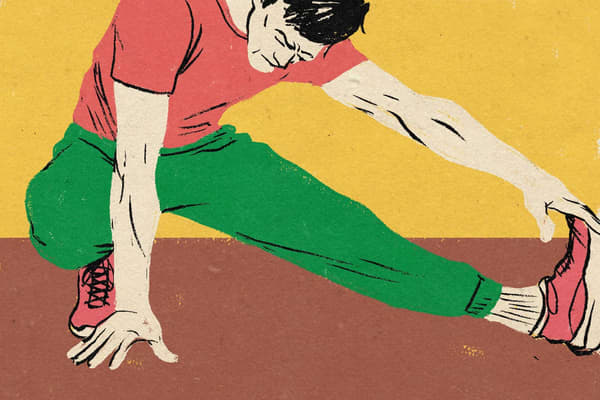Enjoy an extended 60-day return period. Learn More
The health benefits of running a mile every day
Activity
Plus, how to start running if you're brand new to the sport.

Running a mile is a common goal to aim for whether you're a brand-new runner or getting back into a routine after a break. Others on social media are setting out to run one mile a day for 30 days as part of a transformation challenge. While it can be an entry point into running for some, there are also many physical and mental benefits of running one mile a day—even if you never run a 5K.
Ahead, we're breaking down a few of those health perks and sharing how new runners can build up to a mile safely. Plus, we're unpacking whether running a mile a day is considered "enough" exercise or if it's actually "too much", according to experts.
First, is running a mile "enough"—or too much?
According to the current guidelines created by the U.S. Department of Health and Human Services, adults need at least 150 minutes of moderate-intensity physical activity a week or 75 minutes every week of vigorous-intensity aerobic activity—such as jogging or running. The guidelines also call for two days of muscle-strengthening activity each week.
On average, a non-competitive and relatively physically fit runner will complete one mile in about 9 to 10 minutes, while new runners might clock in closer to 12 to 15 minutes. That means, if you run a 10-minute mile, you might actually fall a bit short of that 75-minute per week recommendation, even if you're running every day.
"However, research shows that you don't have to hit 75 minutes of running per week to improve your health", says Ross Arena PhD, PT, who is the head of the Department of Physical Therapy at the University of Illinois Chicago and researches cardiopulmonary physiotherapy and exercise science. "Specific time thresholds of activity, like 150 minutes per week, can also be discouraging or feel unattainable—but the important message is that something is better than nothing", Dr Arena says.
Plus, physiotherapists and running coaches generally don't recommend running every single day, even for one mile. Lydia O'Donnell, Nike Running Coach and founder of the running app Femmi, suggests three or four days per week as a healthier approach. "This allows you to focus the other days on rest, recovery and other forms of movement (like lifting weights or doing bodyweight exercises in the Nike Training Club App)", she says.
"Overall though, if running a mile every day helps you move more and sit less, it can lead to significant health improvements", Dr Arena says. Ahead are a few research-backed benefits, including a lowered risk of chronic disease risk and increased life expectancy.
1.Improve Your Heart Health
You've probably heard running is a great form of cardio—but why is that so important? Low cardiovascular fitness is a strong predictor of cardiovascular disease (CVD), conditions impacting the heart and blood vessels that affect nearly half of adults in the US.
Running can improve markers of cardiorespiratory fitness by challenging both your heart and lungs. It forces your heart to pump harder, strengthening the cardiac muscles, while also increasing your lung capacity. Over time, this leads to a lower resting heart rate and reduced blood pressure, both key signs of improved cardiovascular health.
A study published in Journal of the American College of Cardiology looking at the long-term effects of running on over 50,000 runners (with a mean age of 44) found that runners had approximately 30% higher cardiorespiratory fitness than non-runners. The researchers concluded that running for even 10 minutes a day (the time it might take you to run a mile) can help significantly lower your risk of cardiovascular disease and can lower the chance of dying from heart disease by half.
2.Strengthen your bones and prevent injury
We often focus on building strong muscles, but strong bones work in tandem with muscles to support all of our movements, making bone health just as critical. We've long known that to build strong bones and slow bone loss, you need weight-bearing exercise—meaning you're using your bones and muscles against gravity. High-impact exercises like running, which exert force on the bones, are especially effective at promoting bone health.
However, while running is beneficial for bone health, overtraining can have the opposite effect. As Dr Arena points out, "As you increase your running volume and intensity, the risk of orthopaedic and musculoskeletal injuries rises".
Research shows that endurance runners may be at higher risk of low bone-mineral density and bone stress injuries like stress fractures. By running a mile a day, you can reap the bone-health benefits of running while minimising the risks that can come with running longer distances.
3.Relieve stress and boost your mental health
Many people view running as a way to clear their mind or even a form of therapy—and studies have shown it can increase self-esteem and decrease anxiety. Even a single run can help you feel less sad, anxious and depressed, according to a 2020 review in the International Journal of Environmental Research and Public Health examining the relationship between running and mental health.
While you'll need to run longer distances to experience that relaxed, euphoric feeling known as the "runner's high", running a mile might still be better for mental health long term. The review found that while recreational running led to positive mental-health outcomes, "extreme levels of running" (including long-distance and marathon running) can have the opposite effect.
That's in part because not being able to run due to an illness or injury (which is more common in distance runners) can put long-distance runners at higher risk for psychological distress, including depression and low self-esteem.
However, if you're sticking to a mile, you'll have a lower risk of injury while still reaping the mood-boosting benefits of going out for a run.
4.You might lose weight (if that's your goal)
"There are a ton of health benefits that come with running that have nothing to do with the number on the scales but if you exercise and you're in a caloric deficit, you're going to lose some weight too", Dr Arena says.
Just bear in mind—despite those one-mile-a-day weight-loss transformations you might see on social media—it isn't a silver bullet. A 70kg person burns 360 calories running for 30 minutes (assuming a 10-minute-per-mile pace), according to Harvard Health. That's about 120 calories per mile. However, you need to cut roughly 500 calories a day to lose about half a kg a week, per the Mayo Clinic.
Weight loss comes down to your diet and the calories you take in, so running a mile alone (or even building up to a two- or three-mile running challenge) won't be enough by itself. However, running a mile a day can be a great catalyst to help you make other lifestyle changes if your goal is weight loss.
5.You could live longer
The study published in Journal of the American College of Cardiology also found that running—"even five to 10 minutes a day and at slow speeds"—is associated with "markedly reduced risks of death from all causes".
The study authors concluded that people who ran just one or two times per week and for fewer than six miles led to a lower risk of dying compared with non-runners. In fact, on average, runners lived a whopping three years longer compared with non-runners (after adjusting for other mortality predictors, like smoking).
Those who ran for less than an hour a week had the same mortality benefits compared with those who ran more than three hours per week. Pretty compelling evidence that starting a running habit—even if it isn't a mile every day or 75 minutes every week—can be powerful medicine.
How to start running
Running a mile a day isn't just about running. "Establishing certain healthy habits now can help prevent future injuries and keep you loving the sport—especially as you get fitter, faster and increase your mileage", says O'Donnell.
1.Walk before you run
"A mile is a great distance to set your sights on when you first start running", O'Donnell says. However, she suggests incorporating walking to start and building up to running the entire mile. "For example, you can try running for three minutes, walking for a minute or two and then running for another three minutes", she says.
2.Choose the right gear
"Having an outfit that lights you up and gets you excited to run is really important", O'Donnell says. Not only does it motivate you, but it also makes it easier to go out there and focus on your run.
"Finding the right shoe is really important", O'Donnell says, who suggests the Nike Pegasus as a great, well-rounded running shoe for most people. Running apparel, including the right sweat-wicking running gear or a supportive, high-impact sports bra are also key to keeping you comfortable on your run.
3.Mix up your speed
"Even if you're running the same distance every day, your goal shouldn't always be to run as fast as you can", O'Donnell says. "This approach can cause injury and burnout", she says. Instead, aim for variety to make a new running habit more sustainable. "Try incorporating speed work, slow running and steady-pace work, so you're not working the same energy system time and time again", she says.
4.Build up your mental strength
Not only is variety good for your body, it's good for your mind. "Introducing variety across the mile is a really nice way to keep you motivated and keep your mind busy while you are out there", O'Donnell says. "Running can be hard for beginners, so it's important to build up not just your physical fitness but your mental strength as well", she says.
5.Don't forget about nutrition
"Nutrition plays a huge part in helping our bodies recover", O'Donnell says. "Aim for a high-protein meal post-run to fuel your body, and don't forget about the importance of hydration if you're new to running", O'Donnell says.
6.Prioritise recovery
"A mile can feel quite strenuous and intense on the body if you're a beginner", O'Donnell says. In addition to warming up before running, she suggests slow, deep stretching post-run. The more consistently you include stretching into your mile-a-day routine, the less sore you'll feel and the more likely you'll stick with running long-term.
Words by Kylie Marie Gilbert


























